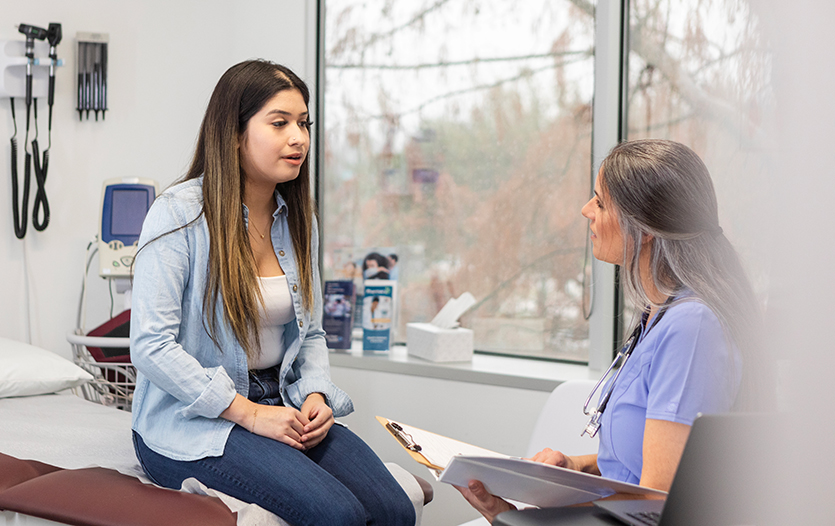
Learning that you are expecting a child is a life-changing event. The effects of the first weeks of a pregnancy can vary greatly from woman to woman, and even from pregnancy to pregnancy, but there are some common signs that many experience. In this post, we’ll identify the initial symptoms, an overview of pregnancy tests and when to connect with your provider.
Early signs of pregnancy
Experts consider the first ten weeks of a pregnancy “early pregnancy.” As early as five weeks in, you may start noticing signs, such as your body feeling different or changes to your emotions.
In early pregnancy, your body goes through a host of changes, and shifts often come on suddenly. The most common signs mothers experience in the first several weeks include:
- A missed period.
- Nausea with or without vomiting. (This is often called morning sickness, but it can happen at any time of the day.)
- Breast changes. (Your breasts may be swollen or tender.)
- Needing to urinate more often.
- Feeling more tired than usual.
Some of the common symptoms mentioned above are uncomfortable but shouldn’t necessarily cause any alarm. There are other events, however, that would warrant a call to your provider. These include:
- Vaginal bleeding
- Pain in your pelvis, especially if it's only on one side
- Belly pain
- Pain when you urinate
- Blood in your urine
When to take a pregnancy test
Exactly when you can take a pregnancy test with accurate results depends on how far into your pregnancy you are. And it depends on which type of test you choose.
When you're pregnant, your body makes a hormone called human chorionic gonadotropin (hCG). In the first 30 days of pregnancy, hCG increases every day. There are two types of pregnancy tests, both of which measure hCG:
- Home pregnancy test (HPT) – It's best to take this test at least 1 to 2 weeks after a missed period. Taking it earlier could give you a false negative result. That's because levels of hCG in your urine may be too low for the test to detect.
- Blood pregnancy test – This test can give you results as early as 6 to 8 days after you ovulate. Blood tests detect low levels of hCG in your body. They may show a positive result early in the pregnancy, when a home test shows a negative result.
How pregnancy tests are done
Pregnancy tests use a sample of your urine or blood to detect if you are pregnant. Here's how the different tests are done:
- Home pregnancy test (HPT) – This type of test uses a urine sample. It's done by holding a test stick in your urine stream or collecting urine in a cup and dipping the test stick into it. Results are shown in a few minutes. They'll be displayed by colored bands, symbols or words in the window of the device. Follow the instructions carefully. (Tip: Taking a urine sample first thing in the morning may give you the most accurate result.)
- Blood pregnancy test – A blood sample is taken at your doctor's office. The results can tell you if hCG is present or not, or exactly how much hCG is in your body.
I’m pregnant, now what?
For some, pregnancy can be a complete surprise, while for others it’s an experience they have been planning for years. Either way, your head is likely spinning with a variety of emotions and questions as you start to think about the future. Prenatal care is vital to keeping you and your baby healthy during pregnancy.
During these visits, your OB/GYN care team will conduct medical checkups and necessary screening tests. They are available to answer any questions you have as you move toward delivery. Parkview also offers a variety of different support services for women who are expecting, including free birth classes, Obstetric Nurse Navigators and Community Health Workers who are available to support you during your pregnancy journey.
Copyrighted material adapted with permission from Healthwise, Incorporated. This information does not replace the advice of a doctor.




